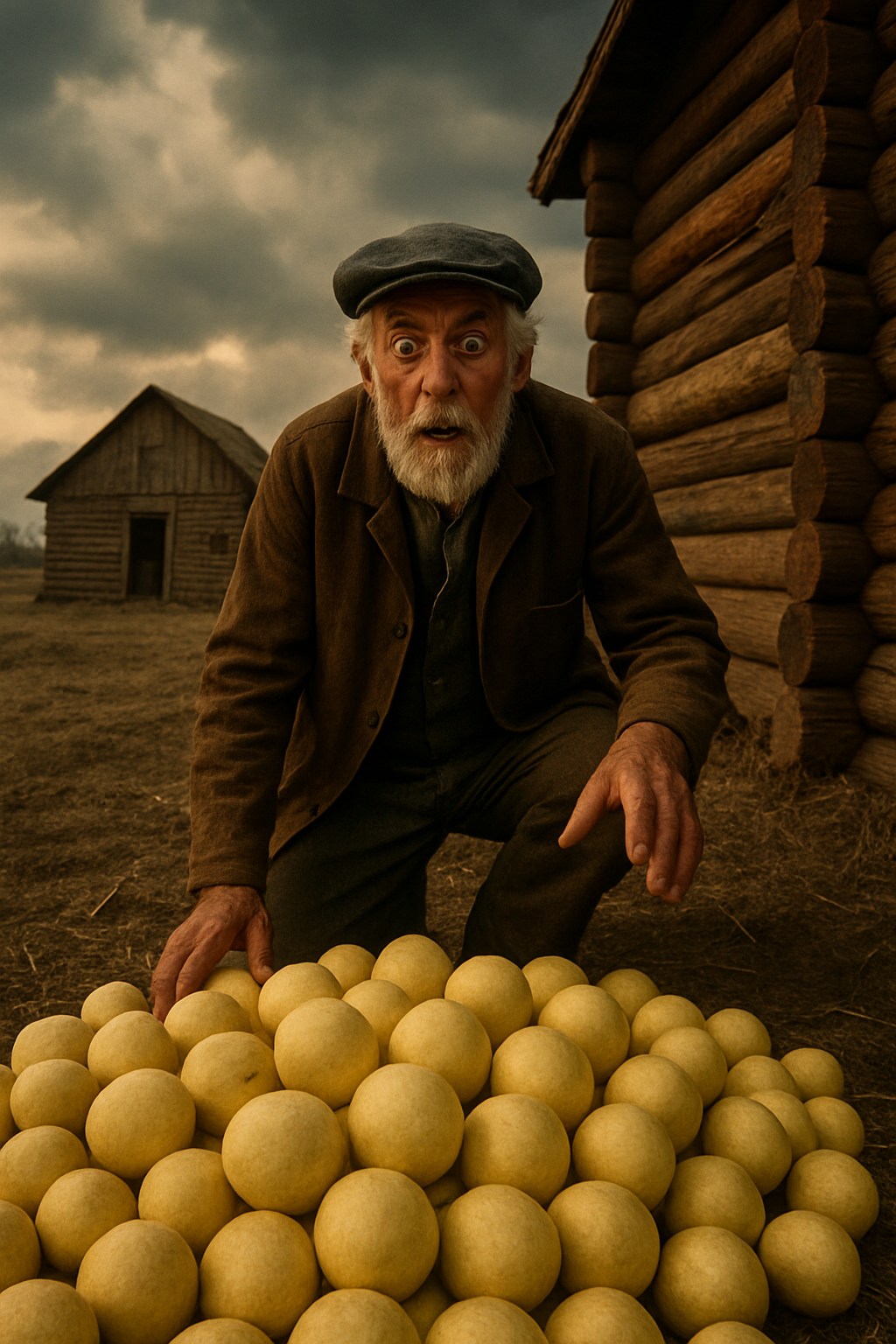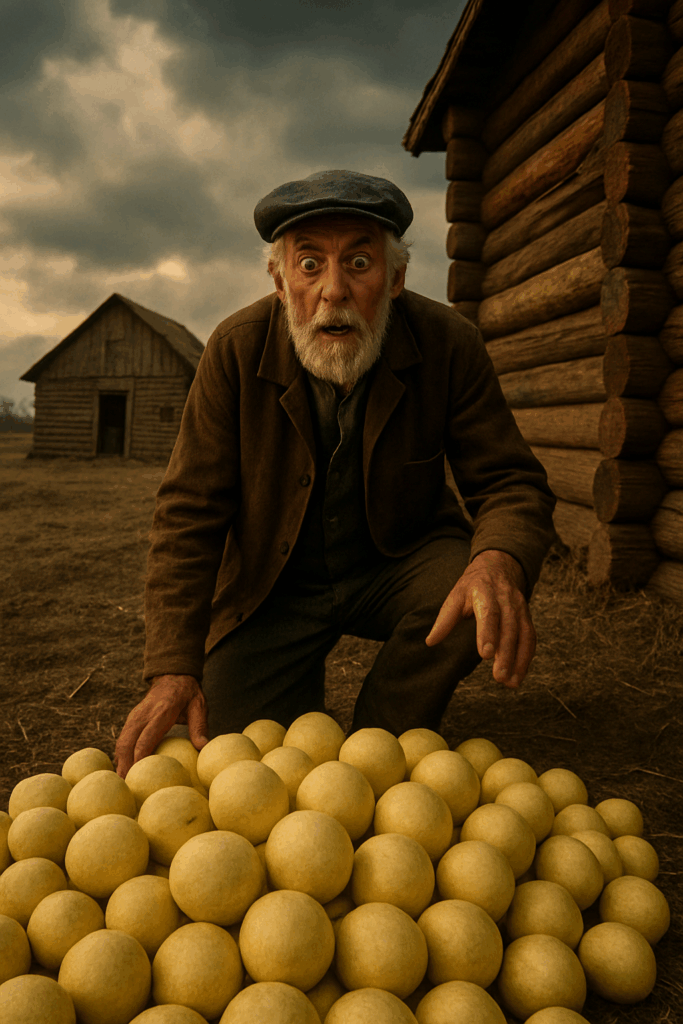Some discoveries don’t ask to be found. They wait — patient, silent, and buried — until the one person who shouldn’t find them finally does.
For Dr. Elias Ward, 68, it began with a sound. Not loud. Not violent. Just a soft whispering beneath the wooden porch of his late wife’s seaside cottage — a noise that came every night, right before dawn, like hundreds of small hearts beating in sync. He told himself it was rats. Or wind. Or grief, creeping back after three long years.
But he was wrong. Because what waited under that porch wasn’t alive. Not yet. The cottage at Grayhaven Bluff had belonged to his wife, Martha, before she died. She’d loved the sea — said the waves spoke a language older than words. Elias never believed in such things. He was a biologist, a man of evidence and logic. But after she passed, the ocean felt different. Not poetic — but watchful.
He stayed because he couldn’t bear to leave her things behind. Her journals. Her shells. Her glass jars labeled with names of marine creatures they’d never discovered. And now, this house was the last trace of her voice — creaking through its old bones every night. But the new sound… that wasn’t Martha. That was something else.
The Whispers in the Floor
It started on a Tuesday. Elias woke around 2:40 a.m. to a faint rustling — like sand being sifted through thin fingers. He turned on the lamp, sat up, listened. There it was again — beneath the floorboards this time.
Soft, rhythmic. Almost like… breathing. He pressed his ear to the cold wood. And swore he heard a whisper.
“Elias…”
He froze. The voice was faint, distant — but unmistakable. It was her voice. Martha. He stayed perfectly still, heart hammering, until the sound faded into the sea wind outside. By morning, he convinced himself it was a dream. Until he saw the dirt. Freshly disturbed soil right below the porch steps, as if something had been moving underneath. By the third night, the noises grew louder. He couldn’t stand it anymore.
At 3:15 a.m., Elias put on his coat, grabbed a flashlight, and went outside. The air was damp and heavy, the waves below whispering against the rocks. When he knelt and shone the light beneath the porch, he stopped breathing. The ground wasn’t earth anymore — it was patterned. Hundreds of round, pale objects covered the soil, packed closely together like a cluster of pearls. Each one about the size of a fist. Smooth. Translucent. Faintly glowing.
Eggs.
He crawled closer, the beam shaking in his hand. The shells seemed to pulse, veins of faint blue light moving inside them like electricity.

They were warm. And humming.
He picked one up — slick and damp, almost alive. It vibrated faintly in his palm.
“What are you?” he whispered.
A voice — her voice — came again from nowhere and everywhere at once:
“You promised you’d finish what we started…”
Elias dropped the egg. It hit the ground and cracked open.
What Was Inside
The smell hit him first — salt and metal, like seawater mixed with blood. Inside the cracked shell was a soft, gray mass, coiled and trembling. And in the center of it, embedded like a seed, was a human eye.
Blue. Familiar. Staring back at him.
He stumbled backward, fell onto the dirt, and scrambled away. His breath came in short, panicked bursts. He didn’t sleep that night. He couldn’t. Because now he remembered something Martha once said — years ago, before her illness took her:
“Do you ever wonder if memory is like coral? Growing in layers, waiting to be broken open?”
He had laughed at the time. Now the words crawled under his skin.
The next morning, Elias searched through Martha’s old things. He found her final research notebook — the one she’d kept locked in a drawer for years. Inside were sketches. Dozens of them.
Eggs. Just like the ones under the porch. Each labeled Specimen α, Specimen β, and so on. And notes — strange, fragmented lines scrawled in her small, looping handwriting:
“Bioelectric resonance between neural tissues — success.”
“Subjects respond to vocal stimuli (my voice only).”
“Pattern replicates hippocampal structure — memory containment possible.”
“If consciousness can imprint itself in matter, then maybe death isn’t an end…”
And beneath all of that, one chilling sentence:
“I’ve begun to grow them beneath the house.”
He remembered now. Her obsession with memory transfer. Her theory that biological cells could hold consciousness through electric resonance. At first, it was theoretical — an attempt to preserve memories of marine species. But then her cancer diagnosis came. And suddenly, her work wasn’t about science anymore. It was about survival. Elias had begged her to stop. She refused.
He thought she’d abandoned the project before she died. He was wrong.
That night, he sat on the porch, staring at the sea. He swore he could see faint lights flickering beneath the waves — the same color as the veins on those eggs. He didn’t realize he was crying until a soft sound came from behind him.
A whisper.
“Elias.”
He turned. One of the eggs had rolled out from under the porch.
It cracked. A slick, translucent form emerged — small, fragile, humanoid. It lifted its head, and for a moment, he forgot to breathe. The face — though unfinished — had her eyes. Martha’s eyes. It reached out a trembling hand.
“Don’t be afraid,” it said, its voice wet and broken, like static under water. “You said you’d bring me back.”
He fell to his knees, trembling.
“I don’t understand,” he whispered. “Martha… what did you do?”
“I made a way back.”
Over the next nights, more eggs cracked. The air around the cottage grew humid and strange, heavy with an odor of brine and ozone. He stopped sleeping. Stopped eating. The porch was now alive — moving. Eggs pulsing in waves, synchronized like a heartbeat. And at night, he heard them whispering. Not one voice, but many.
“Elias…”
“Join us…”
“You said forever…”
He tried to call the authorities once. But when they arrived, the eggs were gone — the soil clean, untouched. They left shaking their heads. Old man. Alone. Losing his mind. But Elias knew what he saw.
And he knew what he’d done — helping her build that machine in the basement all those years ago. The one that could transfer memory through electrical fields. The one she said would “help her live forever.”
He wrote one final entry in his notebook that morning:
“The structures beneath the house are not biological in the traditional sense. They are neurological imprints — living blueprints of thought.”
“Martha’s consciousness must have embedded within the soil through the experiment. The eggs are her fragments — memories growing a body.”
“They are not fully her… but not separate either.”
“Tonight, they will hatch. And I must decide whether to destroy them — or join her.”
He set down the pen, staring at the trembling light coming through the porch cracks. The sea was roaring louder than ever. Almost like applause.
It happened just before dawn. A sound like thunder rolled through the house, shaking the windows. Elias ran outside. The ground beneath the porch was glowing — bright blue, almost blinding. The eggs were splitting open, one by one, releasing tendrils of light that reached toward the sea. Shapes emerged — fluid, ghostlike, merging with the mist. And in the center of it all stood her.
Martha.
Or something that wore her face — radiant and half-transparent, eyes full of sorrow.
“You said you’d find me,” she whispered.
He fell to his knees. “You’re not real,” he said.
“Neither are you,” she replied softly. “You just haven’t realized it yet.”
He looked down — his hands were glowing. His veins pulsing the same faint blue as the eggs. The realization came like a wave breaking through him. He wasn’t the one who survived. He was the echo. The experiment hadn’t saved her — it had trapped them both.
The next morning, the neighbors reported strange lights at Grayhaven Bluff. When the coast guard arrived, the cottage was empty. No porch. No eggs. Just a smooth indentation in the soil — like something had melted through the earth. The only thing left was a note taped to the front gate, soaked with seawater:
“We finally found a way back to each other. But memory is never meant to be alive.” — E.W.
Months later, tourists visiting the cliffs began reporting odd things. Whispers when they walked by the water.
Lights flickering beneath the waves — glowing blue, like veins. Some say, if you stand there long enough and listen, you can still hear them — two voices, faint but clear:
“You promised you’d never forget.”
“I didn’t.”
And if you look closely, you might see small, round shapes bobbing on the tide. Eggs.
Waiting for someone new to find them. Would you dare to look beneath your own porch? Because maybe — just maybe — something you’ve lost is waiting there, trying to come back.


